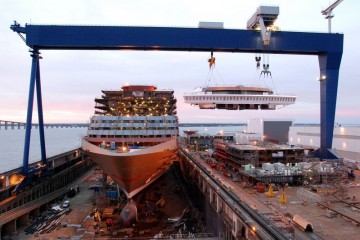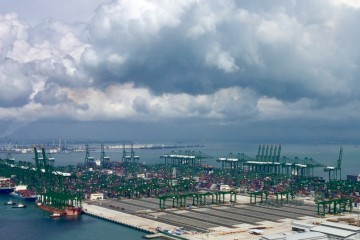Shipping suffers from two plagues: overcapacity and its perceived incapacity to reduce emissions. Both are linked to the inherent nature of shipping – a truly global activity – and the difficulty to reach truly global agreements. Difficult because there are always nations that think that their shipping companies are better off unregulated. This leads to regulatory deadlocks unfortunately all too common in the shipping sector. But what if global regulation would actually serve their self-interest?
Self-interest. For most shipping firms this means: trying to survive and – with a bit of luck – make some profit. How? By getting bigger, using bigger ships. As soon as the frontrunner – usually with a Danish name – introduces a bigger ship, competitors have to follow, in order to stay competitive and not to lose market share. What makes sense for each individual company does not make sense for the sector as a whole, because this collective behaviour creates overcapacity that depresses freight rates. No firm lost market share, but nobody actually makes profits.
This “game” is not in the interest of any other player either. Sure, the freight rate went down so the cost of imported and exported goods will go down. Good news for exporters and consumers one would say. Well, not really; the costs of maritime transport are already so low that a few cents less on the final price will not really make any difference. Moreover, lower prices are counterbalanced by bigger supply chain risks of bigger ships and bigger shipping firms. Inefficient firms will not disappear, as governments tend to bail out national shipping champions.
Regulating ship size could theoretically break this dynamic, but this is a blunt instrument vehemently unwanted by the shipping sector. There is a more elegant way to deal with the overcapacity of ships: imposing a speed limit for shipping. In practice, this means: slower speeds, so more ships would be needed to transport the same amount of cargo; ships that are abundantly available.The shipping could actually like this, as this would allow them to use their ships rather than laying them up or scrapping them. In terms of design, maybe not a maximum speed like for cars, but rather an average speed over a voyage that cannot be exceeded. In this way, ships can still do their voyage optimisation, so speed up when needed. One could also add the possibility for shipping firms to buy the right to go faster. The speed limit could be differentiated per ship type.
And what is more: a speed limit could help shipping’s environmental performance. Fuel consumption – and thus emissions – increase exponentially with speed. Slowing down ship speed will achieve considerable emission reductions. Something highly needed in a time in which shipping emissions have been effectively branded by environmental NGOs as the elephant in the room. So this story reads like a classical economists’ fairy tale, in which the pursuit of self-interest leads to a desirable moral outcome. Let’s act on it.



